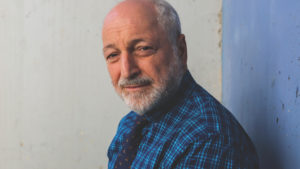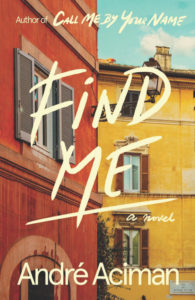
In the 2007 novel Call Me by Your Name, André Aciman created a beautiful and sensual love story about two young men — Elio, a 17-year-old American piano prodigy spending the summer of 1983 in Italy with his parents, and Oliver, a doctoral student working

with Elio’s archeology professor father and living with the family. For a few weeks, they have a passionate, life-altering affair, then Oliver returns to the United States to marry his fiancée, leaving Elio longing for his lost love.
Though the book was highly acclaimed and won a Lambda Literary Award, it was the high-profile 2017 film adaptation, directed by Luca Guadagnino and starring Timothée Chalamet as Elio and Armie Hammer as Oliver, that gave the story widespread fame. Now Aciman has written a sequel, Find Me, published in October by Farrar, Straus and Giroux, which tells us what has happened to Elio and Oliver and also Elio’s father, Samuel, in the intervening years.
Find Me is written in four discrete sections, each titled with musical terms. The first part, “Tempo,” takes place 10 years after that summer and is centered on Samuel, who is now divorced. On a train trip from Florence to Rome to meet his son, Elio, he meets Miranda, a beautiful photographer half his age. The two begin a conversation, which leads to an instant connection. Over the course of the next few days, their relationship intensifies, and they are convinced that in each other they have found their soul mates. The age gap between them is not an issue, and their physical relationship is sensual and romantic. Samuel has found something in Miranda that had clearly been lacking in his life, and they are both ready to upend their lives to be together. Aciman describes a love in which both parties know what they want and are not afraid to say what they feel. The dialogue is realistic and Aciman’s prose expertly brings their scenes to life.
The novel then shifts to Elio in part two, “Cadenza,” which takes place in Paris. Elio is a concert pianist and has become involved with Michel, who is nearly as old as Elio’s father. Their burgeoning affair is filled with apprehension and doubt. There is a sense that neither knows what to expect of or say to the other, how to act or what to do. Though the age gap between Elio and Michel is similar to the one between Samuel and Miranda, in terms of love and relationships, the pairings couldn’t be more different. This is Aciman at his best. While Samuel embraces a break with the past, the lost love of Oliver still hangs over Elio, and Michel knows it. Elio and Michel sense that their relationship will not last very long, but neither of them wants to acknowledge it.
Oliver’s story comes into focus in “Capriccio,” the third part of the novel. He is finishing a sabbatical in New York, and before he returns to his humdrum life in New Hampshire with his wife and sons, he throws a party for his friends. He is fixated on two of his guests, Erica and Doug. The three spend the party talking, drinking, and laughing together as the sexual chemistry between them grows. But it doesn’t lead anywhere, as none of them will betray their partners. As he has so often before, Aciman adeptly sets up a powerfully erotic situation, filled with tension and frustration. During the party, someone plays a capriccio on the piano, reminding Oliver of when Elio played the same piece for him during that summer in Italy. Afterward, Oliver is left alone with thoughts of his empty life, his betrayal of Elio, and what might have been.
In the first three sections of Find Me, Aciman depicts three places to which love can take a relationship. Samuel and Miranda surrender fully and embrace love without questioning it. Elio and Michel’s romance is held back by tension and doubt, both of them aware that it’s not going to endure. And then there’s Oliver, with his unfulfilled life choices and marriage.
The final part of the book is titled “Da Capo,” meaning “from the beginning.” It finally brings back the central characters of Elio and Oliver, but (no spoilers here) it’s up to readers to find out how. It’s relatively brief and might have been longer — or perhaps the subject of the entire book. But in Find Me, Aciman is creating more than just a reunion: he follows the different ways that love happens and the journeys that people take to find each other.



